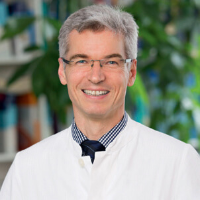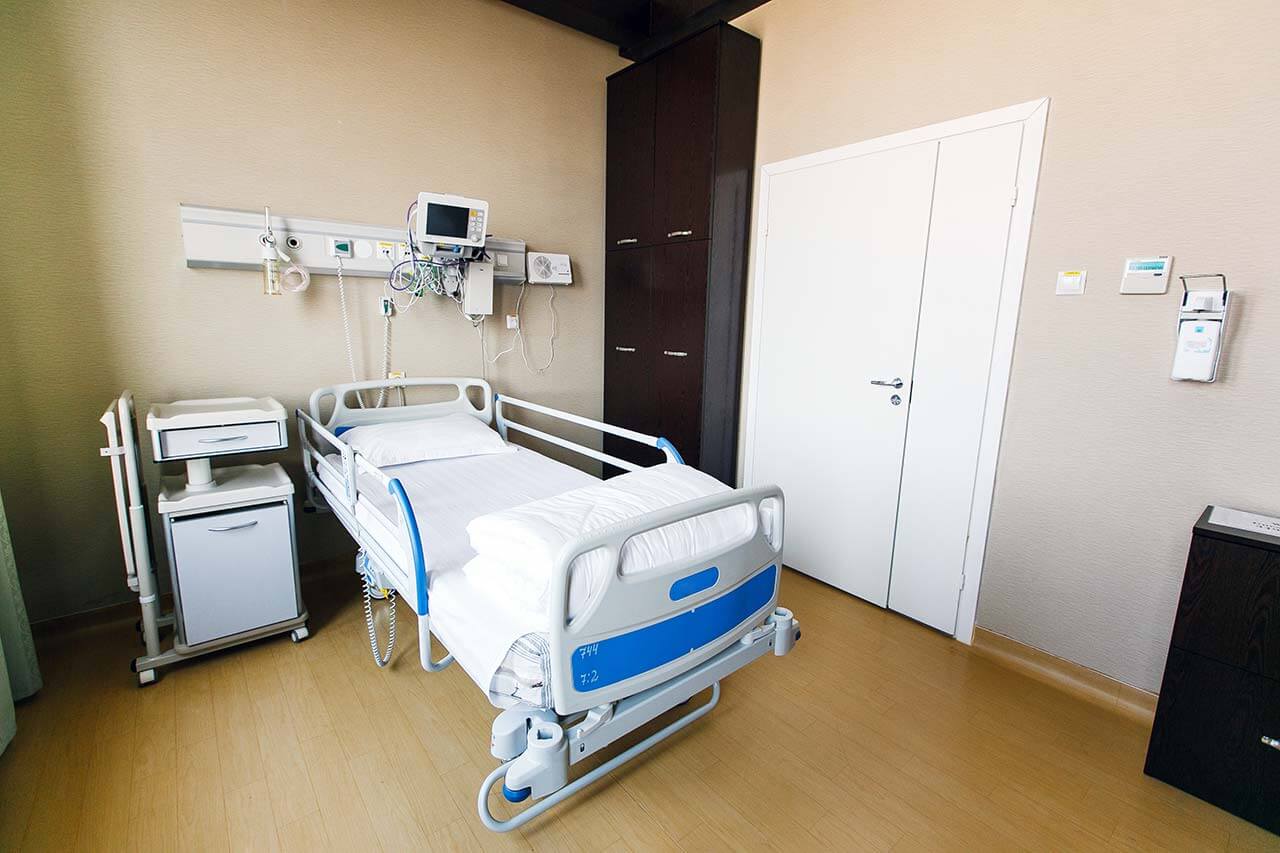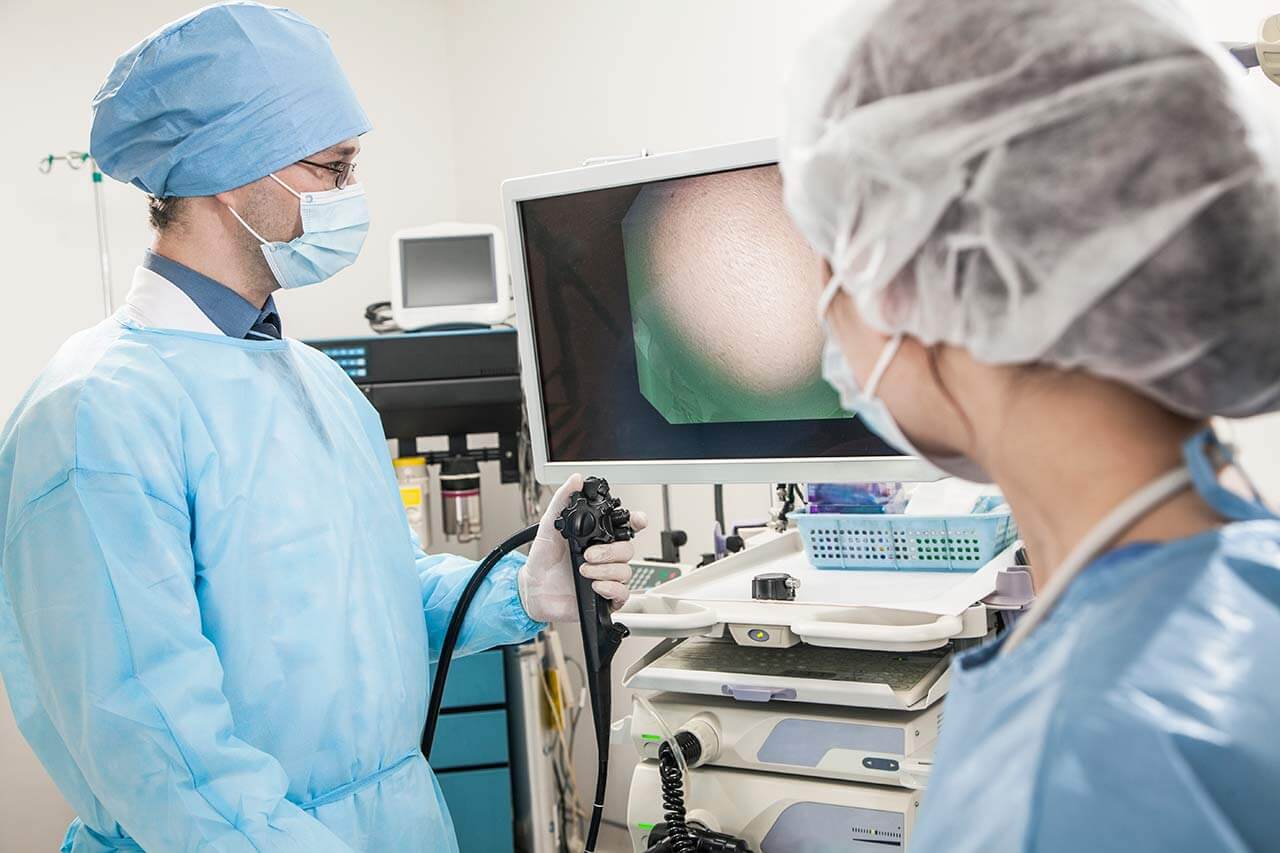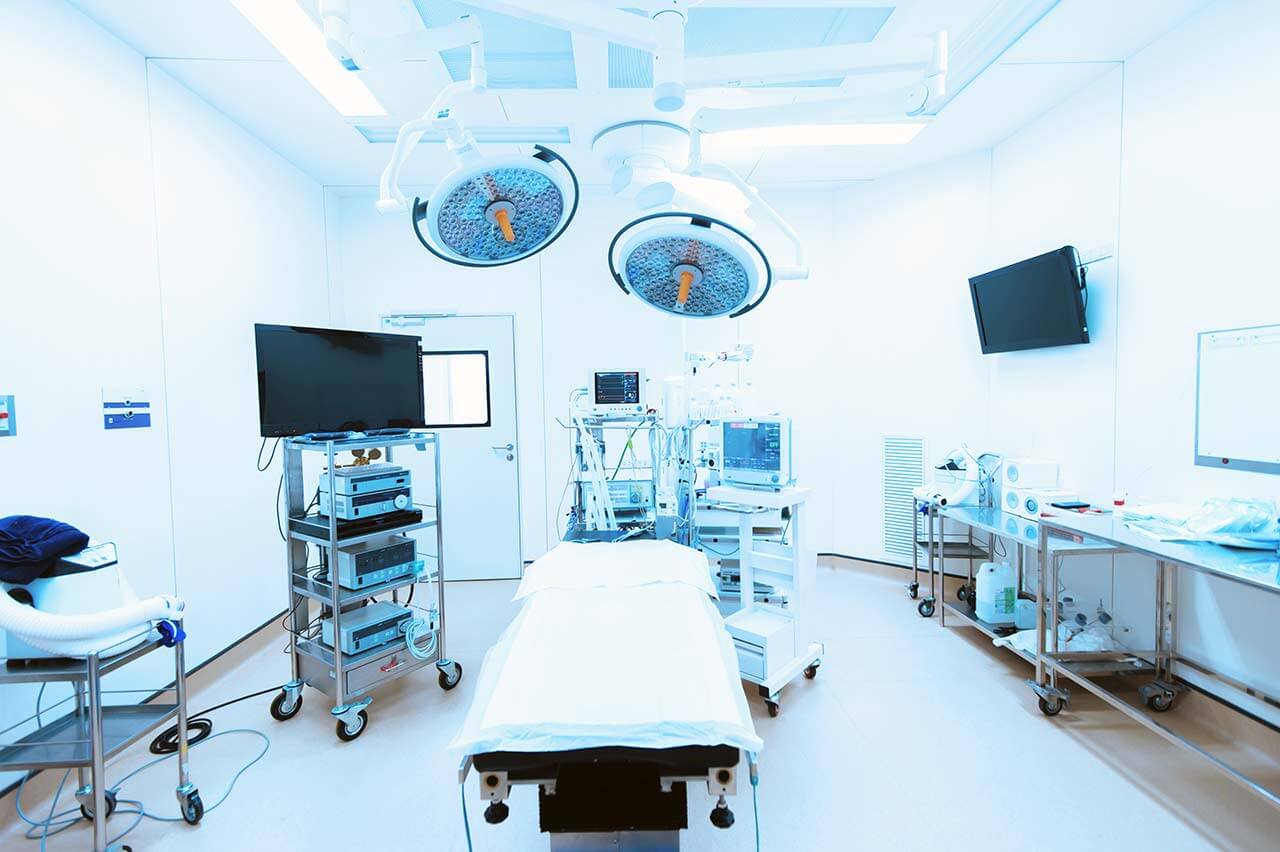
The program includes:
- Initial presentation in the clinic
- clinical history taking
- review of medical records
- physical examination
- laboratory tests:
- complete blood count
- general urine analysis
- biochemical analysis of blood
- TSH-basal, fT3, fT4
- tumor markers
- inflammation indicators
- indicators of blood coagulation
- CT scan / MRI of the abdomen and retriperitoneum
- abdominal and retroperitoneal ultrasound scan
- 1 course of chemotherapy
- nursing services
- consultations of related specialists
- treatment by head doctor and leading experts
- explanation of individual treatment plan
How program is carried out
During the first visit, the doctor will conduct a clinical examination and go through the results of previous laboratory tests and instrumental examinations. After that, you will undergo an additional examination, including laboratory assessment of liver and kidney function, ultrasound scan. Based on the received results, the doctor will elaborate the chemotherapy regimen. If necessary, related medical specialists will be involved in the elaboration of a treatment regimen (tumor board).
Chemotherapy is carried out as the inpatient procedure, with mandatory admission to the hospital. After the placement of a venous catheter, you will stay in a comfortable ward. An infusion system will be connected to the catheter, through which the required drug or a drug combination will be administered. All drugs are administered by intravenous drip, slowly, so the total duration of the infusion can be up to several hours. All this time, doctors and nurses will monitor your health condition closely.
After the course of chemotherapy, you will stay under medical supervision in the ward for a few more hours. After the completion of the chemotherapy course you will receive the medical report with detailed recommendations regarding further treatment. In the future, you will be able to have a distant consultation with your attending physician and schedule the next course of chemotherapy, if necessary.
Required documents
- Medical records
- MRI/CT scan of the abdomen and pelvis (not older than 3 months)
- Biopsy results (if available)
Service
You may also book:
 BookingHealth Price from:
BookingHealth Price from:
About the department
The Department of Gastroenterology, Cardiology, Endocrinology, Oncology and Hematology at the Luisenhospital Aachen specializes in the diagnostics and treatment of gastrointestinal, heart, and endocrine diseases, as well as cancer and hematopoietic diseases. The primary focus of the medical facility is to provide medical care to patients with gastrointestinal pathologies, including diseases of the stomach, large intestine, small intestine, and esophagus. The department's team of gastroenterologists offers the full range of endoscopic diagnostic and treatment options. The specialists work with state-of-the-art equipment, thanks to which patients can count on the high efficiency and safety of medical services. Of particular interest in cardiology is the treatment of coronary artery disease, heart failure, valvular heart diseases, and arrhythmias. Drug therapy regimens and catheter-based techniques are widely used during the treatment course. The main focus of the department's endocrinologists is diabetes mellitus treatment. In the field of oncology, surgeons, radiation therapists, pulmonologists, and other specialists cooperate closely to elaborate an optimal treatment regimen for the patient. The department's oncologists most often treat patients with gastrointestinal and lung cancers. The department also admits patients with hematological diseases, including leukemias, lymphomas, and anemia. The department's team of doctors is known for its high professionalism and for showing understanding and a humane attitude toward the patients and their life situation. The Head Physician of the department is Prof. Dr. med. Hermann Wasmuth.
The department's gastroenterologists are responsible for the diagnostics and treatment of patients with gastrointestinal diseases, such as peptic ulcers, gastritis, stomach polyps, bowel polyps, inflammatory bowel disease (Crohn's disease and ulcerative colitis), diverticular disease, benign and malignant tumors, stenosis, and obstructions caused by malignant diseases or other pathologies. The department is part of the Colon Cancer Center Aachen, which is certified according to DIN EN ISO 9001:2015 standards. Interdisciplinary tumor boards are held here on a weekly basis, where gastroenterologists, oncologists, surgeons, and radiation therapists cooperatively study the patient's diagnostic results and plan an effective course of treatment.
The department has a modern Endoscopy Unit, which includes 4 procedure rooms. A highly qualified team of 11 doctors and 17 nurses with special training in endoscopy work here for the benefit of patients. Most of the doctors in the Endoscopy Unit have more than 20 years of clinical experience in the area of their specialization. The physicians perform more than 8,000 diagnostic and therapeutic endoscopic procedures every year. The specialists have access to state-of-the-art technology, including high-definition video endoscopic systems (HDTV). The Endoscopy Unit successfully performs diagnostic tests such as endosonography, gastroscopy, colonoscopy, esophagogastroduodenoscopy, double-balloon enteroscopy, endoscopic retrograde cholangiopancreatography, and others. Various endoscopy treatment methods are also available here, including endoscopic mucosal resection, endoscopic submucosal dissection, diverticulectomy, endoscopic stent placement, argon plasma coagulation, esophageal variceal ligation, percutaneous transhepatic drainage, and percutaneous cholangioscopy. Many procedures are performed on an outpatient basis. Sedation is used to maximize patient comfort and eliminate pain during diagnosis or treatment.
The department also specializes in providing medical care to patients with heart diseases, including ischemic heart disease, heart failure, arrhythmias, valvular heart diseases, arterial hypertension, pulmonary hypertension, myocarditis, pericarditis, and other pathologies. The medical facility offers its patients well-equipped diagnostic rooms with state-of-the-art equipment for classical echocardiography, stress echocardiography, transthoracic echocardiography, transesophageal echocardiography, electrocardiography, ergometry, spiroergometry, cardiac CT and MRI scans, and many other tests. As for the treatment, it primarily involves drug therapy. The department also performs catheter-based interventions for the implantation of pacemakers and electrical cardioversion for the treatment of arrhythmias. Patients with acute coronary syndrome receive medical care in the Intensive Care Unit.
The department's team of endocrinologists has vast clinical experience in the treatment of type 1 and type 2 diabetes mellitus. The highly specialized center, certified according to the German Diabetes Society (DDG) standards, is available here for patients. Since diabetes mellitus is an incurable pathology, the task of the department's doctors is to compensate for its progression. The specialists carry out training for this purpose, during which they tell patients in detail about the specifics of the disease, the possibilities of self-control, and various forms of therapy. Patients can also receive psychological help if required. Depending on the type of diabetes mellitus and the peculiarities of its course, the department's endocrinologists elaborate an optimal treatment regimen, which is based on the intake of oral hypoglycemic agents and/or insulin therapy. An integral part of the therapeutic process is diet and regular physical activity. The department cooperates closely with vascular surgeons, angiologists, plastic surgeons, and other specialists for the treatment of diabetes-related complications.
The department's therapeutic options are complemented by the diagnostics and treatment of cancer. Special attention is paid to the treatment of gastrointestinal and respiratory solid tumors, leukemias, and lymphomas. The department's oncologists prefer an interdisciplinary approach to patient care, holding weekly tumor boards with the participation of oncologists, radiation therapists, surgeons, and other specialized experts. Each patient receives an individually elaborated treatment regimen, taking into account the specific clinical case. As a rule, solid malignant tumors are treated with the help of surgical resection, which can be supplemented with chemotherapy, radiation therapy, hormone therapy, targeted therapy, immunotherapy, etc. The primary treatment for leukemias and lymphomas is chemotherapy.
The department's range of therapeutic services includes:
- Gastroenterology
- Drug therapy
- Diet therapy
- Endoscopic procedures
- Gastroscopy
- Colonoscopy
- Esophagogastroduodenoscopy
- Endoscopic mucosal resection
- Endoscopic submucosal dissection
- Diverticulectomy
- Esophageal variceal ligation
- Percutaneous endoscopic gastrostomy
- Argon plasma coagulation
- Endoscopic stent placement
- Double-balloon enteroscopy
- Endoscopic retrograde cholangiopancreatography
- Percutaneous transhepatic cholecystostomy
- Endoscopic ultrasound-guided puncture and drainage
- Cardiology
- Drug therapy
- Electrical cardioversion
- Catheter-based procedures
- Pacemaker imlantation
- Pericardial puncture and drainage
- Endocrinology
- Treatment of type 1 and type 2 diabetes mellitus, cystic fibrosis-related diabetes, and gestational diabetes mellitus
- Drug therapy with oral hypoglycemic agents
- Insulin therapy, including pump therapy
- Diet therapy
- Treatment of complications of diabetes mellitus, including diabetic foot syndrome
- Treatment of type 1 and type 2 diabetes mellitus, cystic fibrosis-related diabetes, and gestational diabetes mellitus
- Oncology
- Treatment of solid malignant tumors
- Chemotherapy
- Radiation therapy
- Hormone therapy
- Target therapy
- Immunotherapy
- Treatment of solid malignant tumors
- Hematology
- Treatment of malignant and benign blood diseases (focus on leukemias, lymphomas, and anemias)
- Chemotherapy
- Antibody therapy
- Immunotherapy
- Antihormonal therapy
- Transfusions of blood and its components
- Immunoglobulin replacement therapy
- Treatment of malignant and benign blood diseases (focus on leukemias, lymphomas, and anemias)
- Other diagnostic and therapeutic options
Curriculum vitae
Higher Education and Professional Career
- 1990 - 1996 Medical studies, Justus Liebig University of Giessen.
- 1996 - 1997 Research Internship at the University of Auckland, New Zealand.
- 1997 - 1998 Intern, Department of Endocrinology at the Diabetes Research Institute, University Hospital Duesseldorf.
- 1998 - 1999 Assistant Physician, Department of Endocrinology, University Hospital Duesseldorf.
- 1999 - 2005 Assistant Physician, Department of Internal Medicine III, University Hospital RWTH Aachen.
- 2003 Board certification in Internal Medicine.
- 2005 - 2009 Senior Physician, Department of Internal Medicine III, University Hospital RWTH Aachen.
- 2006 Certified specialist in Hepatology, certificate from the German Society for Gastroenterology, Digestive and Metabolic Diseases (DGVS).
- 2007 Specialization in Gastroenterology.
- 2007 Additional qualification in Transfusiology.
- 2009 Managing Senior Physician, Department of Internal Medicine III, University Hospital RWTH Aachen.
- 2010 Additional qualification in Intensive Care.
- 2011 Invitation to the position of W3 Professor in Gastroenterology, University of Rostock (rejected).
- Since January 1, 2013 Head Physician, Department of Gastroenterology, Cardiology and Endocrinology, Department of Gastroenterology, Cardiology, Endocrinology, Oncology and Hematology, Luisenhospital Aachen.
Photo of the doctor: (c) Luisenhospital Aachen
About hospital
The Luisenhospital Aachen is a modern health facility that offers top-class European-standard service. The medical complex is an academic hospital of RWTH Aachen University, which provides patients with access to innovations in diagnosis and treatment. The hospital first opened its doors to patients in 1967 and has been carrying out a successful clinical practice for more than 155 years.
The hospital has 15 specialized departments, each of which employs a team of experienced and competent specialists who prioritize patients' health. The main areas of clinical activity at the hospital are general surgery, abdominal surgery, thoracic surgery, vascular surgery, plastic surgery, gastroenterology, cardiology, endocrinology, gynecology, obstetrics, mammology, traumatology, and orthopedics.
More than 17,000 inpatients and about 37,600 outpatients are treated in the hospital every year. The team of physicians consists of more than 160 specialists, while the nursing staff consists of about 500 employees. It is noteworthy that the hospital's doctors regularly admit patients from abroad, so the hospital has gained unique experience in working with international patients.
The hospital provides patients with all the necessary conditions for maximum comfort. The medical staff strives to surround the patient with care and take into account their individual needs. The basis of the work of the hospital's team lies in its own slogan: "Thorough care for a patient and their needs". The good reputation of the hospital in the European medical arena and the constant growth in the number of people wishing to be treated here are the best evidence of the excellent medical care provided here.
Photo: (с) depositphotos
Accommodation in hospital
Patients rooms
The patients of the Luisenhospital Aachen live in comfortable single and double rooms. The standard patient room furnishings include an automatically adjustable bed, a bedside table with a pull-out tray, a wardrobe, a table, chairs, a TV, and a telephone. Each patient room has an ensuite bathroom with a shower and a toilet.
Patients are also offered accommodation in enhanced-comfort rooms. Such patient rooms have a more sophisticated design and are additionally equipped with a safe, a mini-fridge, and a cozy space with upholstered furniture.
Meals and Menus
Patients in the hospital are offered three tasty and balanced meals a day. Patients have a choice of three set menus, including dietary ones. If, for some reason, you do not eat all the foods, you will be offered an individual menu. Please inform the medical staff about your dietary preferences prior to treatment.
There is a cozy cafe, Caféhaus Luise, on the ground floor of the hospital, where patients can enjoy delicious main courses, snacks, pastries, cakes, and pies. The cafe also offers a wide range of hot and cold drinks. In the warm season, patients can have lunch, snacks, or enjoy a cup of coffee or tea with dessert on the beautiful terrace.
Further details
Standard rooms include:
Religion
The hospital has a special hall where Catholic and Evangelical worship is held every Sunday morning. It is also a place of solitude for prayer on any day and at any time of day.
The services of representatives of other religions are available upon request.
Accompanying person
Your accompanying person may stay with you in your patient room or at the hotel of your choice during the inpatient program.
Hotel
You may stay at the hotel of your choice during the outpatient program. Our managers will support you for selecting the best option.





